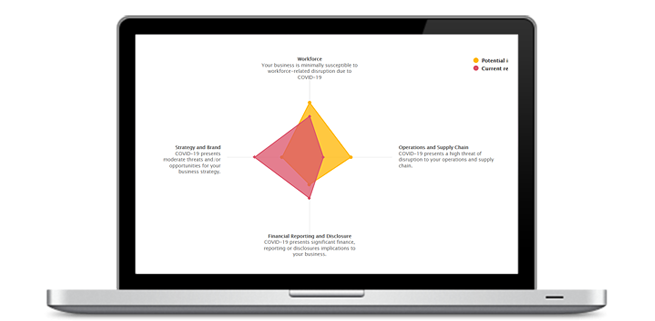{{item.title}}
{{item.text}}

{{item.text}}
As the international response continues to develop, we know that organisations are facing significant challenges and need to respond rapidly. Our Crisis Management team is working together with a range of organisations across industries to help them during this difficult time. Here’s how organisations, including those without direct exposure, can focus their efforts.

Take the diagnostic to assess the potential impact to your business and gauge your readiness to respond.
From our experience, a strongly developed crisis response capability is required to ensure the efficient management of incidents in order to minimise associated negative impacts, meet government priorities around maintenance and confidence, and to ensure the continued delivery of critical national infrastructure. Many organisations have these plans in place for the workplace and supply chain but COVID-19 has already unveiled flaws in some. Given the unknown variables surrounding the outbreak, it is important to review crisis and business continuity plans, develop different scenarios and put them to the test.
Whilst the priority remains human welfare, we are hearing about other employee challenges. Examples include establishing the tax position of people who are moving between countries on an emergency basis, through to companies having to plan on putting production lines on pause due to supply chain issues, with the associated potential impact of asking employees to temporarily stop work.
Ever since the COVID-19 outbreak was declared a pandemic by the World Health Organization (WHO), there have been widespread concerns about the continuity of business operations worldwide. Knowing about the current technology and security limitations of the current work environment and planning for future remote working needs can help an organisation ensure business continuity and minimise disruption.
Where clients are reliant on supply chains in affected areas, rapidly depleting stock levels are becoming a significant risk and clients are working through strategies for alternative sourcing. In certain cases, clients are showing signs of distress and stakeholders (e.g. lenders) are concerned about the future viability of the business. We are discussing different potential scenarios and what these mean for their operations, for example, as cases of viral transmission emerge in different territories.
At present, the extent of the COVID-19 outbreak and by when it will be brought under control remains unknown. But it is certain is that businesses worldwide will need to consider the impact of reduced economic activities and lockdowns on their financial health and stability. Responding to an economic slowdown requires sensitive management of finances, balancing the short-term requirements with the long-term plans by organisations.

PwC experts discuss how organisations can navigate recent regulatory changes on financial stress management, MoF announcements and manage liquidity by optimising cash flows.

A panel of PwC experts organised a virtual client roundtable discussion focusing on security considerations for organisations adapting to the new normal.

As organisations adapt to the "new normal" of remote working, cybersecurity becomes even more critical. PwC experts share their insights on how this transition can be managed better.

Get insights from PwC experts on how to decode the evolving cyber threat landscape for organisations in India.

PwC's panel of experts discuss the areas that you should consider as a part of your planning and response strategies for managing people and organisations.

This webinar discusses how companies can navigate key supply chain challenges during turbulent times and build resilience in supply chain in the post-COVID-19 world.
{{item.text}}

{{item.text}}
Our PwC Crisis and Resilience teams across the network are experienced in working with companies, governments, regulators, NGOs and international organisations around the world, helping them to prepare for and respond to some of the most high profile pandemics, including Ebola, MERS, SARS, H1N1 (swine flu) and H5N1 (bird flu). Key areas that we provide support include:
Developing and assessing crisis and response plans
Designing and implementing timely and targeted communications
Managing, collecting and identifying patient treatment data
Get in touch if you would like to discuss the implications for your organisation.
References
1: World Health Organization, "WHO Director-General's opening remarks at the media briefing on COVID-19 - 11 March 2020," https://www.who.int/dg/speeches/detail/who-director-general-s-opening-remarks-at-the-media-briefing-on-covid-19---11-march-2020.